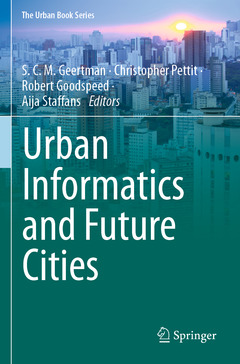Introduction.- Part I: Data analytics and the COVID-19 pandemic.- Smart governance and COVID-19 control in Wuhan, China.- Using public-private data to understand compliance with mobility restrictions in Sierra Leone.- Development of a spatio-temporal analysis method to support the prevention of COVID-19 infection: Space-time Kernel density estimation using GPS location history data.- Part II: Big data and smart cities.- A review of spatial network insights and methods in the context of planning: Applications, challenges, and opportunities.- Transport infrastructure, Twitter and the politics of public participation.- Public perceptions and attitudes towards driverless technologies in the United States: A text mining of Twitter data.- Assessing the value of new big data sources for transportation planning: Benton Harbor, Michigan case study.- How various natural disasters impact urban human mobility patterns: A comparative analysis based on geotagged photos taken in Tokyo.- Revealing the spatial preferences embedded in online activities: A case study of Chengdu, China.- Part III: Data-driven research of activity patterns.- Application for locational intelligence and geospatial navigation (ALIGN): Smart navigation tool for generating routes that meet individual preferences.- Pedestrian behaviour characteristics based on an activity monitoring survey in a university campus square.- Developing a GIS-based tourist walkability index based on the AURIN walkability toolkit – Case study: Sydney CBD.- Sequential patterns of daily human activity extracted from person trip survey data.- Understanding the economic value of walkable cities.- (Big) data in urban design practice: Supporting high-level design tasks using a visualization of human movement data from smartphones.- Examining passenger vehicle miles traveled and carbon emissions in the Boston metropolitan area.- Part IV: Open data and spatial modeling.- Development of a household urban micro-simulation model (HUMS)using available open-data and urban policy evaluation.- An agent-based bushfire visualisation to support urban planning: A case study of the South Coast, NSW 2019-2020.- Development of an agent-based model on the decision-making of dislocated people after disasters.- Evidence-based design justice: Synthesizing statistics and stories – to create future "Just" cities.- Part V: Geodesign and planning support systems (PSS).- Geodesign between IGC and geodesignhub: Theory and practice.- The role of technology tools to support geodesign in resilience planning.- Planning support systems for long-term climate resilience: A critical review.- Part VI: Geospatial data analysis.- Aggregation of geospatial data on "street units": The smallest geographical unit of urban places.- Local betweenness centrality analysis of 30 European cities.- Model for estimation of building structure and built year using building façade images and attributes obtained from a real estate database.- A spatial analysis ofcrime incidence and security perception around a university campus.- Sightseeing support system with augmented reality and no language barriers.- GeoMinasCraft: A serious geogame for geographical visualization and exploration.




